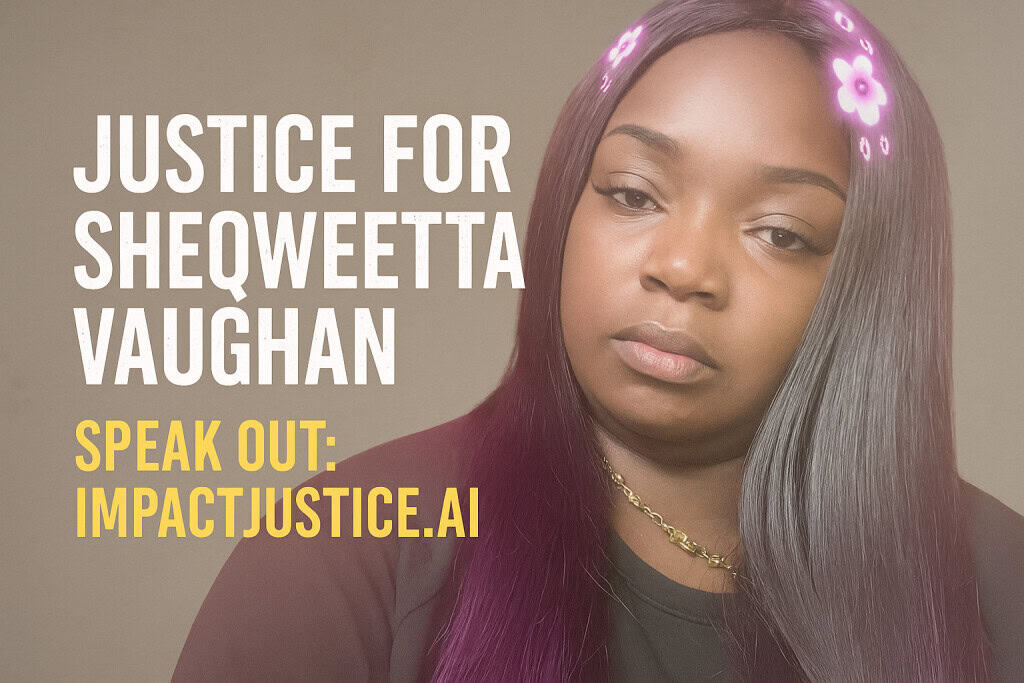On July 9, 2025, Sheqweetta Vaughan, a 32-year-old mother incarcerated at Lee Arrendale State Prison in Georgia, was found dead in her cell. By the time staff discovered her, her body was already decomposing. Her death is not only a tragedy—it’s a stark indictment of the Georgia Department of Corrections (GDC) and how it treats those in its custody.
A Mother Forgotten
Sheqweetta had given birth just months earlier, in January 2025, and was reportedly battling postpartum depression—a serious condition requiring mental health support, medical oversight, and regular monitoring. Instead of care, she was left in a prison system notorious for neglect, minimal mental health resources, and dangerous staffing practices.
At Arrendale and across Georgia’s prisons, emergencies are routine—but responses are rare. Her decomposed state suggests she may have been dead for some time before discovery. Who knew? Who failed? How long did she suffer alone?
Family Demands Accountability
Her family demands answers. They demand transparency. Civil rights attorney Ben Crump has publicly called for justice, amplifying the case as an example of how incarcerated women are often treated as invisible.
Media outlets like NBC have covered the case; The Marshall Project has included her in its record of deaths behind bars. But reporting is not enough—systemic change is overdue.
A Systemic Failure Exposed
This is not an isolated incident. In 2024, over 100 homicides and more than 300 total deaths occurred in Georgia prisons. A 2024 DOJ report documented persistent issues of violence, medical neglect, corruption, and extreme understaffing.
Arrendale, in particular, has long been a flashpoint. In the GPS article Georgia’s Arrendale State Prison: A Grim Reality for Women1, we documented unsafe conditions, retaliation, and structural decay in the women’s facility.
Sheqweetta’s death strips away any illusions: Georgia’s women’s prisons are failing their inmates.
The Human Loss
Sheqweetta was more than a statistic. She was a mother, a daughter, a human being with hopes and a future. She deserved medical attention, mental health support, and compassion. Instead, she was neglected until it was too late.
Her case threatens to become just another entry in a ledger of prison fatalities unless we demand it mean more.
Call to Action

We cannot let this death be buried in silence. We must transform grief into action.
- Use Impact Justice AI (https://impactjustice.ai) — a free tool in the GPS toolkit — to quickly generate and send powerful letters to your state legislators, GDC leadership, and the media. It’s fast, effective, and lets your voice be heard.
- Contact your representatives and insist on a full, independent investigation into Sheqweetta’s death and the treatment of incarcerated women in Georgia.
- Share her story widely—on social media, community forums, and with press organizations.
- Demand systemic reform to ensure mental health care, maternal support, and safety for all women behind bars.
Silence is complicity. Speak now.

Read More From GPS
To understand the broader context and structural failures at Lee Arrendale and across Georgia, read:
- Georgia’s Arrendale State Prison: A Grim Reality for Women (GPS) — our deep dive into neglect, retaliation, and unsafe living conditions in Arrendale.
- In and Out: The Lives Destroyed by the GDC
- Invisible Scars: How Georgia’s Prisons Perpetuate Trauma and Abuse
- Stop the Silence: Why Georgia Must Legalize and Monitor Cell Phones in Prisons
- Violence and Corruption Unleashed: The Truth About Washington SP
- Buried Truth: The Story of Roy Mason Morris

- Georgia’s Arrendale State Prison: A Grim Reality for Women https://gps.press/georgias-arrendale-state-prison-a-grim-reality-for-women/[↩]

1 thought on “Sheqweetta Vaughan’s Death at Arrendale Prison: Another Tragedy of Neglect in Georgia”